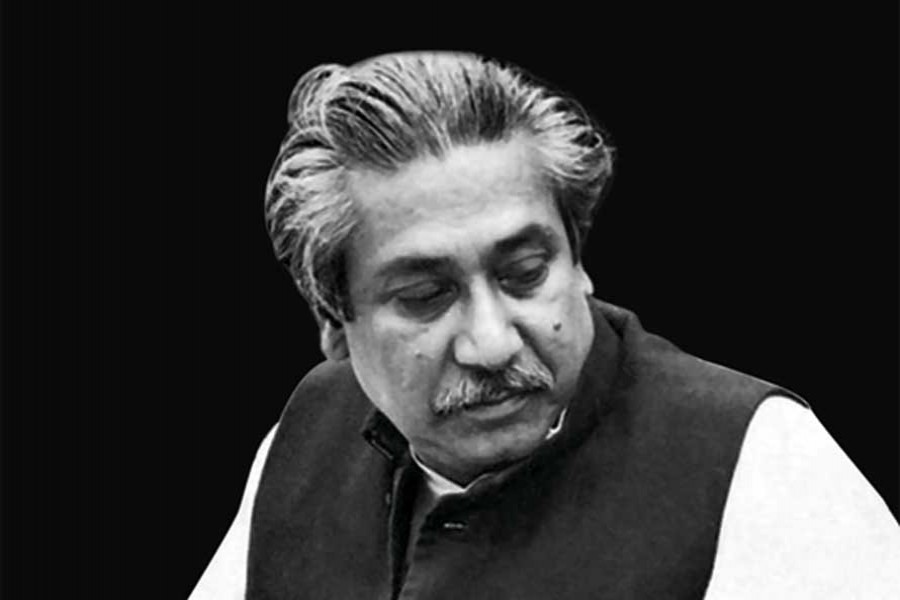
Published :
Updated :

On the 44th death anniversary of the Father of the Nation, Bangabandhu Sheikh Mujibur Rahman, the entire nation will lament the loss of a leader who was larger than life and dedicated to the welfare of his people. It is said by many members of civil society, social scientists and others that he is one of the greatest Bengalis born over the past thousand years. His March 07-speech is one of the defining moments in the history of Bangladesh. It is one of the most magnificent speeches, which speaks about his towering personality. In his magnificent and thunderous voice, he proclaimed: "Our struggle is for our freedom. Our struggle is for our independence". After the passage of 48 years, the speech has become a part of world heritage. In fact, he was an intuitive force whose interests and activities stimulated the Bangladeshi people to achieve their nationhood. He managed to kindle a hope for an independent nation amongst this oppressed nation and successfully led it towards achieving that dream. This is why he will remain alive in not just the history of Bangladesh and South Asia, but in the history of the world. He seemed to understand the desire of his people.
An determined spirit against all kinds of aggression and suppression, his desire for independence radiated as much for the people of this land as for the fellow oppressed humanity across the world.
By gaining control of the political party Awami League, Bangabandhu added a new dimension in the politics of the then-East Pakistan. 'It was a strident nationalism grounded in Bengali culture', a movement, not unlike that of 1905. As it is said, long before the liberation war, the people of East Pakistan were facing aggression and suppression at the hands of West Pakistanis. The latter group were ruling the former with an iron fist despite a distance of 1,000-miles. Through a remarkable progress in political events, Sheikh Mujibur Rahman emerged as the leader of the people of East Pakistan. He seemed to represent their hopes and aspirations.
To become great, one must not necessarily have extraordinary qualities or brilliance. A man who can take the right decision at a time of trials and tribulations is really the hero that everyone needs. This is absolutely true for Sheikh Mujibur Rahman. He was the leader who took correct decisions in the 1950s and 1960s, leading to the birth of a new nation on the face of the world in 1971. He never tired from considering the many ways through which the lives and conditions of his people can be improved.
Bangabandhu learnt from the greatest leaders in Gopalganj, Dhaka, Kolkata and other parts where he visited. He gained the character and knowledge from his surroundings as he viewed them needed to fathom and materialise the dreams and desires of his people.
Bangabandhu was assassinated nearly 44 years ago. He was brutally murdered along with most of his family members around the crack of dawn on August 15, 1975 by a cabal of army personnel as part of a deep-rooted conspiracy against the country and its independence. His two daughters-Sheikh Hasina, now the incumbent Prime Minister, and Sheikh Rehana-survived the bloodbath as they were both abroad at that time.
The people of Bangladesh had experienced the military coups of Ayub Khan and Yahya Khan. Both were bloodless. But the August 15-coup was the most brutal military coup in history.
Shahid Quadri, a prominent Bangladeshi poet, pointed out that the assassination of this great leader along with his family members was one of the prime reasons for his migrating to Europe and later to the US. In a poem he expressed his discontent that the killers of Bangabandhu were all Bangladeshis. "I shall never hear anything more horrifying," he wrote.
It rained the day when Bangabandhu was buried. Political leaders, who could have resisted the soldiers, were in hiding on that day. Those who did not resist were inducted into the cabinet. Four great leaders who were close to Sheikh Mujib were jailed and murdered by the same group. These very men had engineered the provisional government while in exile in 1971, and planned and materialised the war of liberation against the Pakistani junta at the time.
It is indeed terrible misfortune that a great statesman like Bangabandhu had to die in the hands of none other than his own people. Were the great patriots of Africa, Asia and Latin America assassinated by their own people? No, they were not. It is a shame that such an assassination occurred in our country.
However, a great patriot like Bangabandhu does not die. He remains alive in people's hearts and lingers in their memories.
Bangabandhu was buried on the bank of the river Madhumati. A mausoleum stands there today in memory of the great leader who spent his life in the service of his countrymen. Every day people from all walks of life and from different corners of the world visit the mausoleum to pay respect to the great leader. In such a way the name of this man, the greatest son of our soil is honoured and cherished.
Bangabandhu Sheikh Mujibur Rahman's utmost dedication and sacrifice for the people of this land will never fade. He was the leader of the people, for the people -- not for a particular span of time but for all times to come.
Nuzhat Rifa Ehsan is a practising lawyer.
ehsannuzhat@yahoo.com


 For all latest news, follow The Financial Express Google News channel.
For all latest news, follow The Financial Express Google News channel.